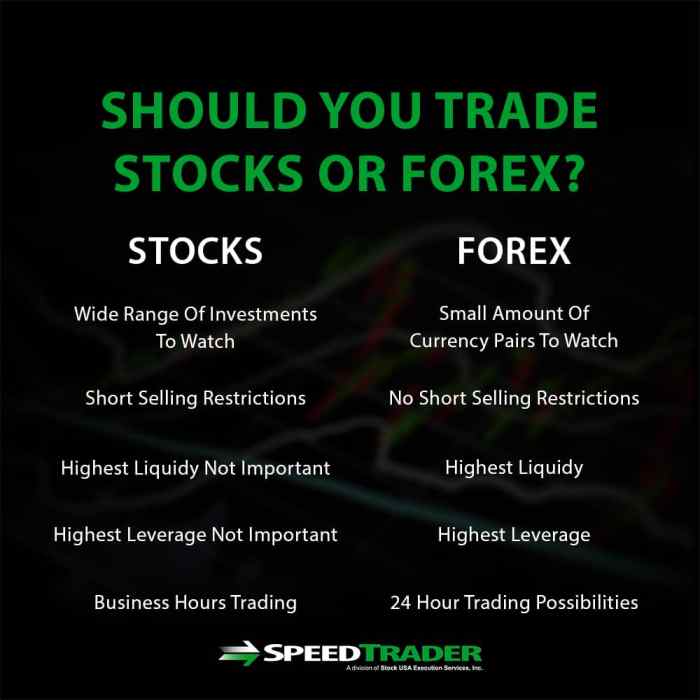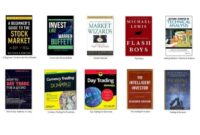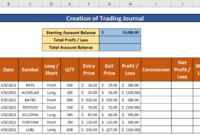Difference between Forex and stock market, this introduction immerses readers in a unique and compelling narrative, with ahrefs author style that is both engaging and thought-provoking from the very first sentence.
Exploring the fundamental variances between Forex and the stock market sheds light on the intricacies of these financial realms, offering a glimpse into the contrasting dynamics that define each market.
Introduction to Forex and Stock Market
When it comes to investing, two popular options are the Forex (foreign exchange) market and the stock market. Both markets provide opportunities for individuals and institutions to buy and sell financial instruments, but they operate in different ways.
Forex, also known as the foreign exchange market, is where currencies are traded. In this market, participants buy and sell currencies in pairs, such as USD/EUR or GBP/JPY, with the goal of making a profit from changes in exchange rates. On the other hand, the stock market is where shares of publicly traded companies are bought and sold, allowing investors to own a portion of a company’s equity.
Brief History of Forex and Stock Market
The Forex market has a long history that dates back to ancient times when merchants exchanged different currencies to facilitate trade. However, the modern Forex market as we know it today began to take shape in the 1970s when currencies were allowed to float freely against each other.
On the other hand, the stock market has its origins in the 17th century when the first stock exchange was established in Amsterdam. Over the years, stock markets have evolved and expanded globally, becoming key pillars of the global financial system.
Size and Scope of Forex and Stock Market
- The Forex market is the largest and most liquid financial market in the world, with a daily trading volume exceeding $6 trillion. It operates 24 hours a day, five days a week, allowing traders to participate from different time zones.
- On the other hand, the stock market represents ownership in publicly traded companies and is divided into various exchanges such as the NYSE and NASDAQ. The global stock market has a total market capitalization of over $90 trillion, but trading volumes can vary significantly based on market conditions.
Participants in Forex and Stock Market: Difference Between Forex And Stock Market
When it comes to the Forex and stock markets, there are different key players involved in each. Understanding who these participants are and their roles is crucial in grasping how these markets operate.
Key Players in the Forex Market
In the Forex market, the key participants include:
- Commercial and investment banks
- Hedge funds
- Central banks
- Multinational corporations
- Retail traders
These participants engage in currency trading for various reasons, such as speculation, hedging, or conducting international business transactions.
Role of Brokers in the Stock Market
Brokers play a crucial role in the stock market by facilitating the buying and selling of securities on behalf of investors. They act as intermediaries between buyers and sellers, executing trades and providing market research and advisory services to their clients.
Types of Participants in Forex vs. Stock Market
While both markets have common participants like banks and institutional investors, there are key differences in the types of participants involved:
- Forex Market: Participants in the Forex market primarily focus on trading currencies and are often involved in high-volume transactions. Retail traders also play a significant role in this market.
- Stock Market: In contrast, the stock market involves a broader range of participants, including individual investors, mutual funds, pension funds, and insurance companies. Brokers play a more prominent role in facilitating trades in the stock market.
Overall, understanding the different participants in each market is essential for navigating the complexities of Forex and stock trading effectively.
Trading Hours and Accessibility

When it comes to trading hours and accessibility, the Forex and stock markets have some key differences that traders should be aware of.
Forex Market Trading Hours
The Forex market operates 24 hours a day, five days a week, making it the most accessible market for traders worldwide. The market opens on Sunday evening in Asia and closes on Friday evening in North America, allowing traders to participate in trading at almost any time of the day or night.
Stock Market Trading Hours
In contrast, the stock market has specific trading hours that vary depending on the country and exchange. For example, the New York Stock Exchange (NYSE) is open from 9:30 a.m. to 4:00 p.m. Eastern Time, Monday through Friday. This limited trading window can make it challenging for traders with busy schedules to actively participate in stock market trading.
Accessibility for Retail Investors
Both the Forex and stock markets are accessible to retail investors, but the Forex market is generally considered to be more accessible due to its 24-hour trading schedule. Retail investors can easily trade Forex from the comfort of their own homes or on the go using online trading platforms. On the other hand, the stock market’s limited trading hours may require retail investors to adjust their schedules to participate in trading activities.
Market Structure and Liquidity

The market structure and liquidity play a crucial role in determining the efficiency and effectiveness of trading in both the Forex and stock markets. Let’s delve into the differences between the two in terms of their structure and liquidity levels.
Forex Market Structure
In the Forex market, trading is decentralized, meaning there is no central exchange where all transactions take place. Instead, participants trade directly with each other or through electronic communication networks (ECNs). This structure allows for 24-hour trading, as the market operates across different time zones. Liquidity is abundant in the Forex market due to the high number of participants, including banks, financial institutions, hedge funds, and individual traders.
Stock Market Liquidity vs. Forex Market Liquidity
The stock market, on the other hand, operates through centralized exchanges where buyers and sellers are matched. While the stock market also has high liquidity, it may vary depending on the trading volume of a particular stock. In comparison, the Forex market is known for its deep liquidity, with trillions of dollars traded daily. This high liquidity in the Forex market means that trades can be executed quickly and at stable prices.
Impact on Trading Strategies
The market structure and liquidity levels in both markets significantly influence trading strategies. In the stock market, traders may face challenges in executing large orders without impacting the price due to lower liquidity in some stocks. On the other hand, the Forex market’s deep liquidity allows traders to enter and exit positions easily, even with large volumes.
In conclusion, the decentralized structure of the Forex market and its high liquidity levels provide traders with ample opportunities to engage in seamless trading activities. Understanding these differences can help traders tailor their strategies accordingly to navigate the unique characteristics of each market.
Instruments Traded in Forex and Stock Market

When it comes to trading, both the Forex and stock markets offer a wide range of instruments for investors to choose from. Understanding the types of instruments traded in each market is crucial for making informed investment decisions.
Common Instruments Traded in Forex
In the Forex market, the most commonly traded instruments include:
- Currency pairs: These are the primary assets traded in the Forex market, such as EUR/USD, GBP/JPY, and USD/JPY.
- Contracts for Difference (CFDs): These allow traders to speculate on the price movements of currency pairs without owning the underlying assets.
- Options: Forex options give traders the right, but not the obligation, to buy or sell a currency pair at a specific price on or before a certain date.
Types of Securities Traded in the Stock Market
In the stock market, investors trade a variety of securities, including:
- Stocks: Also known as shares or equities, represent ownership in a company and entitle the holder to a portion of its profits.
- Bonds: These are debt securities issued by governments or corporations, providing fixed interest payments over a specified period.
- Exchange-Traded Funds (ETFs): ETFs are investment funds traded on stock exchanges, representing a diversified portfolio of assets.
Comparison of Risk Associated with Trading Different Instruments, Difference between Forex and stock market
The risk associated with trading different instruments in Forex and the stock market varies:
- Forex: Trading currency pairs in the Forex market can involve high volatility and leverage, leading to significant potential gains or losses in a short period. Traders should carefully manage risk and use appropriate risk management strategies.
- Stock Market: While stocks can also be volatile, they generally offer more stability compared to Forex trading. However, stock prices can be influenced by various factors, such as company performance, economic conditions, and market sentiment.
In conclusion, the distinctions between Forex and the stock market, as elucidated throughout this discussion, underscore the diverse opportunities and risks inherent in both arenas. Navigating these differences can empower investors to make informed decisions suited to their financial goals and risk tolerance levels.
When it comes to the world of Forex trading, there are various types of Forex markets that traders need to be aware of. From spot markets to forward markets and futures markets, each has its own unique characteristics and trading strategies. Understanding the differences between these markets can help traders make more informed decisions when buying and selling currencies. To learn more about the different types of Forex markets, check out this informative article on Types of Forex markets.
With the rise of cryptocurrencies, Dogecoin has been making headlines in the news. Whether it’s about price fluctuations, market trends, or new developments in the Dogecoin community, staying updated with the latest Dogecoin news is essential for investors and traders alike. To stay informed on the latest Dogecoin news, be sure to read the latest updates on Dogecoin news.
The underlying technology behind Bitcoin is its blockchain, a decentralized and secure public ledger that records all transactions in the network. Understanding how the Bitcoin blockchain works is crucial for anyone looking to invest or trade Bitcoin. To delve deeper into the intricacies of the Bitcoin blockchain, make sure to read this comprehensive article on Bitcoin blockchain.




